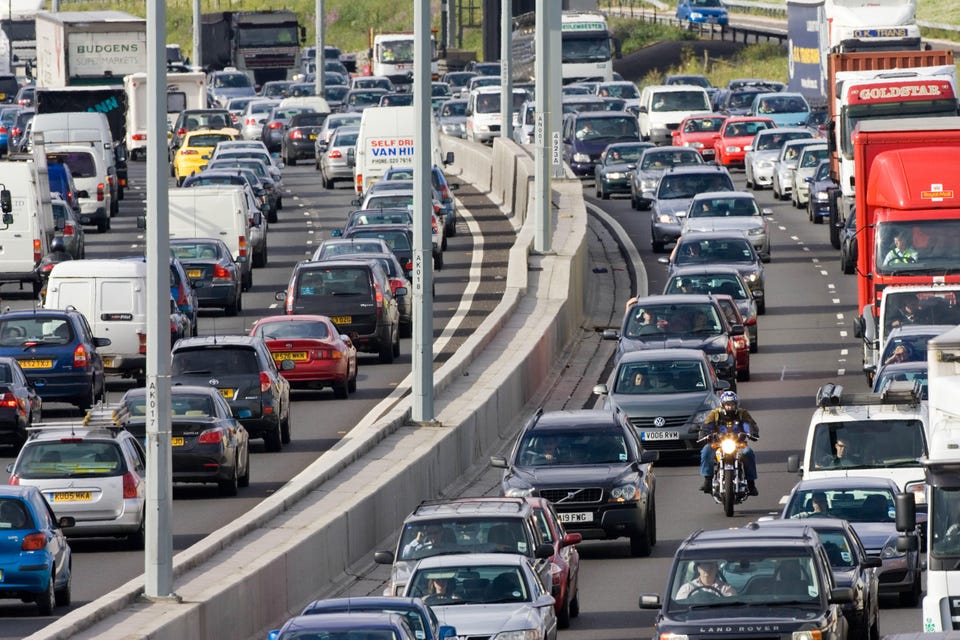Sustainability Cars Returning To Roads Pose Huge And Harmful Risk, Says LNER Carlton Reid Senior Contributor Opinions expressed by Forbes Contributors are their own. I have been writing about transport for 30 years. New! Follow this author to improve your content experience.
Got it! Jul 6, 2022, 05:35am EDT | Share to Facebook Share to Twitter Share to Linkedin Motor traffic congestion on M25 motorway, near London, United Kingdom (Photo by Tim Graham/Getty . . .
[+] Images) Tim Graham/Getty Images A report commissioned by the government-owned British train operating company LNER states that “cars returning to our roads post Covid-19 pose a huge and harmful risk. ” Meanwhile, rail travel, argues the report, “provides low emission travel for millions of people. ” Demand for rail travel remains around a third below pre-pandemic levels.
Nevertheless, Railway to Recovery states that “societal awareness of the need to reduce CO2 emissions has never been higher. ” The report continues that greater concern for the planet grew during the pandemic, “and it was clear that action needed to be taken at every level: Government, business and individual. ” According to LNER, which operates the East Coast rail franchise from London King’s Cross to the north of England and Scotland, one of the company’s new Azuma trains emits 4 kilograns of carbon per passenger between Edinburgh and London.
In comparison, a flight emits 132 kilograms per passenger, and a car emits 114 kilograms. Steam traction inspector Jim Smith is pictured with a new Azuma train standing alongside the Mallard . .
. [+] steam locomotive at York Station, Yorkshire, as London North East Railway’s new Azuma service is launched. (Photo by Danny Lawson/PA Images via Getty Images) PA Images via Getty Images MORE FOR YOU Is Carbon Capture Another Fossil Fuel Industry Con? Sustainable Fashion Wants Brands To Redefine Business Growth Trouble With Predicting Future Of Transportation Is That Today Gets In The Way “During Covid-19, we experienced a cleaner and less polluted environment,” argues the LNER-commissioned report.
“Prior to the current focus on petrol at forecourts and hold-ups on motorways, many more people are seeking ways to limit harmful emissions,” states Railway to Recovery , adding that many people “abandoned their car keys and took up cycling or other forms of active travel. ” Cover of LNER’s Railway to recovery report. LNER Tom Ball, the founder of Bristol’s coworking space DeskLodge, was quoted in the report saying: “We have recently converted parking spaces into a secure cycle storage for 42 bikes with showers, so our businesses can help staff cycle and link up with train routes.
” Railway to Recovery was produced for LNER by London-based marketing and consultancy firms Thread & Bloom and Nina & Pinta. The report states that rail travel is “well placed to offer the sustainable transport option that businesses are looking for” and that 89% of office workers are confident that face-to-face meetings will become the norm again by the end of this year. LNER’s managing director David Horne said: “While virtual platforms have grown enormously, our research has found that people want to get back out and travel for business and to reap the benefits of meeting clients and colleagues in person.
” However, the cost of rail travel is a disincentive for many people. In March, regulated fares in England and Wales rose by 3. 8% which is the steepest increase since January 2013, according to figures from industry body the Rail Delivery Group.
LNER—or London North Eastern Railway—is owned by the DfT OLR Holdings for the U. K. government’s Department for Transport (DfT).
LNER took over the InterCity East Coast franchise in June 2018 and is contracted to operate the service until at least 2025. Follow me on Twitter or LinkedIn . Check out my website .
Carlton Reid Editorial Standards Print Reprints & Permissions.
From: forbes
URL: https://www.forbes.com/sites/carltonreid/2022/07/06/cars-returning-to-roads-pose-huge-and-harmful-risk-says-lner/



